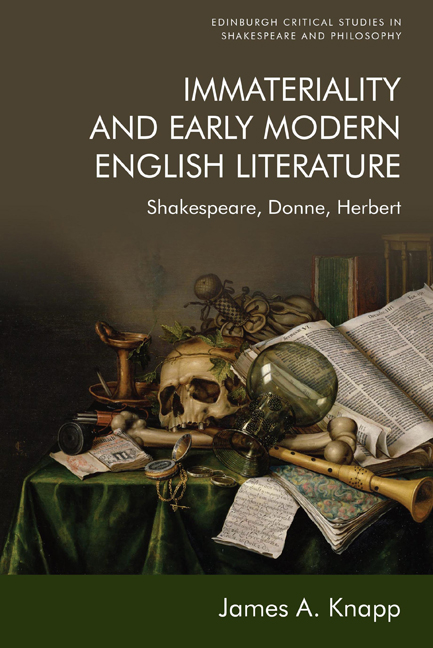Introduction: Shakespeare’s Naught
Published online by Cambridge University Press: 10 October 2020
Summary
To be or not to be, I there's the point.
The Tragical History of Hamlet [Q1]But no obiect of what nature or force so euer it bee can make the least alteration or impression into the will of GOD, whose nature is immutable, yea impassible. For hee is not materiall as are the creatures, yea euen the Angels themselues who must needs be granted to consist of, and in some matter, which may suffer and bee altered, whereof it commeth that not onely men, but euen the spirituall Angels, are subiect to affection, passion and perturbation: but God is a pure and mere forme, and therefore altogither actuall, hee is immateriall, and therefore impassible.
Thomas Morton of Berwick, A Treatise of the Nature of GodMannes minde … standeth … in contemplation of immortall, and perdurable thinges: therto, in suche as fade, and fall, it teacheth, ordayneth, appointeth, commaundeth … Yet is the selfsame minde by the felouship, and companie of the senses, and desires, many a time called away from that principall office, to consider these unstable, and mutable thinges: and sometime to cast in conceite fourmes disseuered from the mater, mathematically: and sometime to view things sensible, that can in no wise bee sondered from the materiall substance: as Elementes, Beastes, Herbes, Trees, Metalls, Stones, and such like: all that which must needes be sensed …
Nicholas Grimald, ‘To the Reader’, Marcus Tullius Cicero, his three books of dutiesBeing, believing, thinking. In early modern England, discourse concerning the ‘big questions’ turned on the distinction between the material and immaterial. While much recent scholarship has focused on material culture, the present study is concerned with its immaterial complement. In particular, the following pages explore the metaphysical status of immateriality and its figurative power in England from the last decades of the sixteenth century through the first half of the seventeenth. What occurred during these turbulent and eventful years amounts to a sea change in the way immateriality and materiality were conceived and represented, providing writers with an opportunity to capitalise on shifts in the shared understanding of the nature of things and thus produce some of the most celebrated literature in English.
- Type
- Chapter
- Information
- Immateriality and Early Modern English LiteratureShakespeare, Donne, Herbert, pp. 1 - 41Publisher: Edinburgh University PressPrint publication year: 2020



